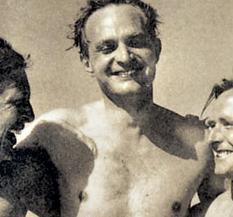Literary Scandals of Yesteryear: David Leavitt and Stephen Spender

Literary scandals come for everyone, eventually. (Okay, not everyone: Toni Morrison, scot-free!) Or maybe just everyone named David. Let’s turn the clock back to the delicious year 1994. In late 1993, David Leavitt published While England Sleeps, about, simply, two men, one who becomes a zealot, signs up with the International Brigade, and then regrets it; his lover comes to Spain to try to rescue him. One source he drew upon was a memoir, by Stephen Spender, who sued based on copyright as we also understand it in the U.S. but also on the British iteration of moral rights, which we would consider (quite) expansive. And this was a fairly rare case in literary scandoldom, in that it involves a work of fiction drawing upon a work of nonfiction.
The most interesting way to read about this conflict is in reverse order of the parties’ individual publications in the Times, because that is how we used to settle our literary disputes, starting with Spender’s long public complaint, which is stirring, arch and bitchy, in the way that only a then-85-year-old English intellectual could be.
Mr. Leavitt, in his essay, wrote that the theme of his book, “if it belongs to anyone, belongs to E. M. Forster, who wrote in his famous essay ‘What I Believe’” that “ ‘if I had to choose between betraying my country and betraying my friend, I hope I should have the guts to betray my country.’” Mr. Leavitt added: “It seems to me crucial, in reading these sentences, to remember that Forster was homosexual, since for gay men and lesbians the choice between cause and friend is rarely abstract; indeed, particularly in the age of AIDS, it is often viscerally real.”
It is surprising to a member of my generation that sometimes young people today cannot imagine the intense urgency with which antifascist youth responded in 1937 to the probability of Hitler’s prison state gaining total domination of Europe. The idealistic volunteers in the International Brigade felt that far from betraying their country, they would preserve its freedom by fighting to prevent, as they believed, the greater catastrophe of a world war…..
In appropriating for his own novelistic purposes this Spanish episode from my book, Mr. Leavitt added a new, distorting dimension to “World Within World” by introducing into the story of an upper-class English writer and his working-class friend lubricious accounts of homosexual lovemaking between them. This left me wondering: if the laws regarding obscenity had been different when I wrote “World Within World,” would I have added scenes describing sexual acts?
The answer, I am sure, is no. In our own lives, living among other people, we are aware, of course, of their love affairs, heterosexual or homosexual. But we do not know, nor, I think, want to know about their sexual acts. Knowledge of what people do when they are in bed together may be true, but it is not true to what we know or wish to know about them.
In part that’s one reason why I resent my biography being mixed up with David Leavitt’s pornography. I still feel that if he wanted to write about his sexual fantasies, he should write about them being his, not mine, for by his use of my copyrighted book, his central narrator was made clearly identifiable.
It’s a fairly stirring defense! While also prudish and priggish.
Five months previous, this is what Leavitt had published:
THAT MOST NOVELS CONTAIN episodes derived from “real life,” as well as characters based on real people, is a fact taken for granted by students of literature, not to mention literary biographers…..What is plagiarism? I had always assumed that plagiarism meant trying to pass off someone else’s writing as one’s own. “While England Sleeps” does nothing of the kind; rather, it is a piece of historical fiction based on the facts of someone else’s life. “The true artist,” Oscar Wilde observed, “is known by the use he makes of what he annexes, and he annexes everything.” Yet if the current legal trend in England continues, it may lead to the imposition of a standard few works of fiction could ever meet. England, a nation with no equivalent of our First Amendment, a nation that has given us Clause 28 (forbidding the provision of funds for material that is seen to “promote” homosexuality), a nation that legislates for male homosexual sex a higher age of consent than for either heterosexual or lesbian sex because supposedly boys mature more slowly than girls, may well be on its way to becoming a nation in which writers are simply afraid to write.
“While England Sleeps,” among other things, is a novel about the hypocrisy of English attitudes toward homosexuality. In this regard its writing prophesied the crisis its publication would precipitate.
This battle has attractive propositions on each side, unlike the grimier battles of today — at least no one felt the need to talk about “emotional truth,” the kind of thing we have to hear from the “semi-non-fiction crowd,” and the likes of John D’Agata.
And Leavitt ends with a bit of generosity that he might yet live to regret: “I am 32 and I have never written an autobiography; but if I ever do, and if something in its pages grabs some young novelist’s attention, I hope he’ll feel free to take whatever he wants from the story.”
